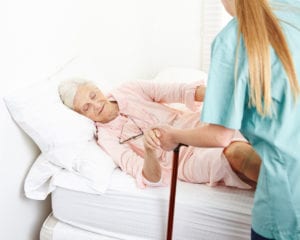Walking abnormalities are defined as unusual, uncontrollable walking patterns, most often faced by the elderly. While your loved ones may not want to address their difficulty walking, it is most helpful to find the proper elderly care for their mobility troubles. Severe walking abnormalities may require continuous physical therapy and medical care. Walking abnormalities are often referred to as gait abnormalities. Gait refers to the pattern of walking.
4 Common Risk Factors Regarding Senior Walking Abnormalities
Genetics may cause them or other factors, such as diseases or injuries. Walking abnormalities can affect the muscles, bones, or nerves of the legs. Abnormalities may be present in the entire leg or in certain parts of the leg, such as the knee or ankle. Problems with the foot may also result in walking abnormalities. These can be temporary or long-term conditions, depending on their cause.
Most often your seniors face a risk of losing walking abilities in response to some of the health issues that have come on with the path to their elderly years. The following four issues are the most common causes and risks for walking trouble:
1. Walking abnormalities are more likely to affect people at an older age. Mobility impairment comes along due to additional risks like low physical activity, obesity, strength or balance impairment, and chronic diseases such as diabetes or arthritis.
2. Gait and balance disorders exist around 10 % among seniors between the ages of 60 and 69 years, along with over 60% in seniors over the age of 80.
3. Roughly 30% of the population over the age of 65 falls at least once each year. Then, this increases to about 50% when calculating the falls made in people aged 80 years and older.
4. Between 2016 and 2017 around 210,553 falls were calculated among emergency hospital admissions for seniors over the age of 65. At least two-thirds of those people were at least 80 years old as well.
Common Causes of Walking Abnormalities in Seniors
So many overall causes exist in affecting the balance and mobility of seniors, especially in what they experienced from their younger years. It is hard to believe that there should be elderly care because of any of these injuries or health issues. However, they tend to infect the long-term physical mobility of seniors and some form of care will help the elderly remain mobile.
● Mobility issues/Astasia/Balance troubles

● Arthritis
● Birth defects
● Leg injuries
● Bone fractures
● Infections that damage leg tissue
● Shin splints
● Tendonitis
● Psychological disorders (e.g. conversion disorder)
● Inner ear infections
● Nervous system disorders (e.g. cerebral palsy or a stroke)
Additional Causes of Walking Difficulty
● Vascular – Arrhythmias, Hypotension, Postural hypotension, Transient ischaemic attacks, Cerebrovascular accident, Multi-infarct dementia
● Neurological – Multiple sclerosis, Cord compression, Motor neurone disease, Syringomyelia, Spinal cord tumors, B12 deficiency, Syphilis, Tardive dyskinesia, Akathisia, Parkinson’s disease, Parkinsonism (drug-induced), Cerebellar tumors, Ataxia, Wernicke’s encephalopathy, Peripheral neuropathy, Chorea
● Orthopedic – Arthrodesis of hip joints, Arthritides (e.g. osteoarthritis, rheumatoid arthritis), Spinal disease (e.g. stenosis), Fractures, Foot problems (e.g. corns, bunions)
● Balance and Coordination – Alzheimer’s dementia, Labyrinthitis, Degenerative changes in the inner ear
● Muscles – Myopathies
● Metabolic – Diabetes Mellitus (e.g. autonomic neuropathy or foot drop), thyroid disorders
● Others – Anti-hypertensive medication, Sedatives, Antipsychotics, Ethanol, Anticonvulsants, Loss of confidence (including depression)
With so much information available, there is no reason to ignore concerns for your senior loved ones and their potential walking abnormalities. If you have come across any of these risks, it would be helpful to seek out quality elderly care to help ensure your seniors’ long-term health and safety.
If you or an aging loved one needs Elderly Care in Elk Grove, CA, remember Senior Home Care Services. Call us at (916) 514-7006 for more information.
Sources
https://www.aafp.org/afp/2010/0701/p61.html
https://www.healthline.com/health/walking-abnormalities
https://patient.info/doctor/walking-difficulty-and-off-legs-in-adults
- Helping Seniors Reduce Health Anxiety - April 18, 2025
- Why Should Seniors Consider Adding Soy to Their Diets? - April 7, 2025
- Four Ways to Celebrate Spring With Your Homebound Elderly Loved One - April 2, 2025


